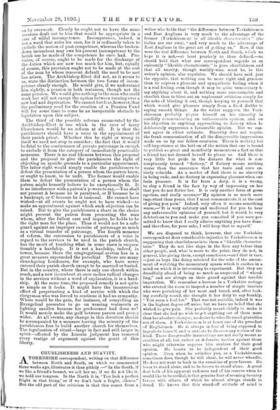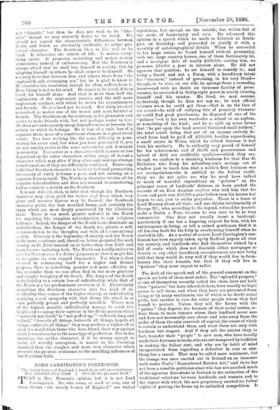CHURLISHNESS AND SUAVITY. A YORKSHIRE correspondent, writing on that difference between
North and South, on which we commented three weeks ago, illustrates it thus pithily :—" In the South, if we like a friend's bonnet, we tell her so; if we do not like it, we hold our tongues. In the North it is, 'You look a perfect fright in that thing,' or if we don't look a fright, silence." But the odd part of the criticism is that this comes from a writer who holds that "the difference between Yorkshiremen and East Anglians is very much to the advantage of the former (Yorkshiremen) in all likeable characteristics" (the italics are our own), "and very much to the advantage of East Anglians in the great art of getting on." Now, if this were the real difference between North and South, which we hope it is not,—at least precisely as thus defined,—we should hold that what our correspondent regards as an eminently "likeable characteristic" is pure churlishness, and that all suavity, though worldly-wise, must be, in this writer's opinion, also repulsive. We should have said just the opposite, that nothing can be more right and gracious than to express a pleasant and sympathetic feeling when it is a real feeling, even though it may be quite unnecessary tc say anything about it, and nothing more unreasonable and churlish than to blurt out an unpleasant criticism simply for the sake of blurting it out, though keeping to yourself that which would give pleasure simply from a fixed dislike to saying smooth things. As the writer suggests, the York- shireman probably piques himself on his sincerity in candidly communicating an unfavourable opinion, and on his objection to anything approaching to flattery when he deliberately suppresses a favourable opinion. But we can- not agree in either estimate. Sincerity does not require the frank communication of all the disagreeable impressions made on us by our fellow-creatures. There is nothing but self-importance at the bottom of the notion that one is bound to publish so great and manifestly momentous a fact as that a friend has not dressed herself to please us. And there is very little but pride in the distaste for what is con- temptuously termed "flattery," if flattery means nothing worse than the assurance that her taste and ours en- tirely coincide. As a matter of fact there is no sincerity in being rude, and no flattery in expressing pleasure when one feels pleasure. It is far from a duty, it is a wrong, to slap a friend in the face by way of impressing on her that you do not flatter her. It is only another form of gross egotism, and really means,--' My opinion is so much more important than yours, that I must communicate it at the cost of giving you pain.' Indeed, very often it means something worse,—' It is very salutary and medicinal for you to hear any unfavourable opinions of yourself, but it would be very deleterious to you and make you conceited if you were per- mitted to know that I really admire anything you have done; and therefore, for your sake, I will keep that to myself.'
We are disposed to think, however, that our Yorkshire correspondent does considerable injustice to Yorkshiremen in suggesting that churlishness is to them a "likeable character- istic." They do not like slaps in the face any better than other people, and, what is more to the point, they do not, in general, like giving them, except sometimes,—and that is rare, —just as boys like doing mischief for the sake of the amuse- ment of watching the momentary spasm which it excites in a mind on which it is interesting to experiment. But they are dreadfully afraid of being so much as suspected of " wheed- ling," and are always on their guard against that terrible imputation. We remember a hostess in a Yorkshire cottage who entered the room to inspect a number of simple tourists who were partaking of her meat and bread, and, after look- ing carefully round, she thought it her duty to say frankly, "You seem a foul lot." That was not amiable, indeed it was
the highest degree offensive, but we have no belief that she wished to give pain. She probably meant chiefly to make it Clear that she had no wish to get anything out of them more than her absolute charges ; no desire to wheedle small gratuities out of them. A Yorkshirein en is at heart one of the proudest of Englishmen. He is always in fear of being supposed to ingratiate himself, and is anxious to disavow any notion of the kind. These disagreeable insinuations are not really meant as cruelties at all, but rather as defensive tactics against those who might otherwise suppose him anxious for their good opinion. He boasts to be independent of their good opinion. Even when be swindles you, as a Yorkshireman sometimes does, though he will cheat, he will never wheedle. He does not want to bask in the sunshine of your favour. He loves to stand alone, and to be known to stand alone. A great deal both of his apparent rudeness and of his reserve when he would like to be cordial, is that genuine fear of seeming to curry favour with others, of which he almost always stands in dread. He knows that this stand-off attitude of mind is not "likeable," but then he does not wish to be "like- able," though he may sincerely desire to be loved. We sbould not regard the characteristic differences between North and South as absolutely creditable to either pro- vincial character. The Southern likes to like and to be liked. It lubricates the wheels of life. It makes every- thing easier. It promotes sociability and makes society stimulating instead of embarrassing. But the Northern is always afraid that he shall lose himself in society, that by adapting himself to others he shall cease to be himself. He not only feels that between him and others there flows "the tinplumb'd, salt, estranging sea," but he is glad to know it. He cherishes his insulation, though he often suffers from it. Mere liking is not to his mind. He wants to be loved, if he is loved, for himself alone. And that is more than half the explanation of the unpleasant reserve, and the still more unpleasant candour, with which he treats his acquaintances and friends. He is a hard nut to crack. But when his shell is cracked, he makes one of the truest and most faithful of friends. The Southern, on the contrary, is far pleasanter and easier to make friends with, bat not perhaps easier to love. He does not unfrequently merge himself—more or less—in the society to which he belongs. He is less of a unit, less of a separate atom, more of a constituent element in a great social whole. You have nothing like the same difficulty in pene- trating his outer rind, but when you have penetrated it, you slo not usually arrive at the same substantive and dominant personality. You arrive at a character which is more or less dependent on the other characters within range of it,—at a character which may alter if they alter, and undergo strange transformations if they are differently combined. Hence any individual Southern character is liable to be found permeating the society of which it forms a part, and not existing as a separate force in itself. The Northern character retains all its separate individualities, and does not succeed in constituting half so coherent a society as the Southern.
It is not difficult, then, to infer that though the Northern character may often yield the better stuff from which very great and massive figures may be formed, the Southern character yields the best moulded forms, and certainly the types which are most deeply penetrated by the Christian ideal. There is too much granite self-will in the North for anything like complete subordination to any religions influence. Indeed, the danger of the North is too dominant an individualism, the danger of the South too plastic a self- accommodation to the thoughts and wills of a conventional exiety. Courtesy is the beginning of charity, and the South is the more courteous and, therefore, better prepared for such charity as St. Paul insisted on as better than even faith and hope, because including both. The North can hardly endure to give itself away even for divine:purposes, so that it might fail to recognise its own rugged lineaments. Yet when it does succeed in renouncing itself for a higher and diviner purpose, there is something grander atd more effective in the surrender than we can often find in the more gracious and simpler benignity of the South. The danger of the South is its liability to a certain loss of individuality, while that of the North is a too predominant assertion of it. Christianity stimulates the Southern character into the kind of in- dividuality that comes of the higher charity, an individuality impljing a real sympathy with that divine life which is at once perfectly potent and perfectly unselfish. Where men of the highest possible individuality manage to reach this height and to merge their egotism in the divine passion which " vaunteth not itself," is "not puffed up," " suffereth long and i3 kind," " beareth all things, believeth all things, hopeth all things, endureth all things," they may produce a higher effect upon the world than those who have found their way against much fewer obstacles to the same type of perfection. Bat in the meantime the milder character, if it be strong enough to resist all worldly corruption, is nearer to the Christian standard than the rougher and more iron character which presents the greatest resistance to the moulding influences of the Christian faith.











































 Previous page
Previous page